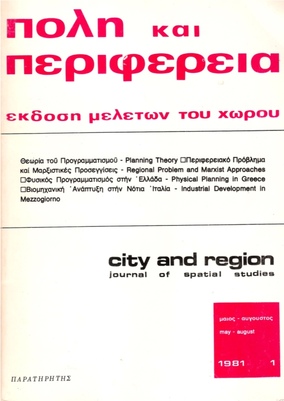[Abstract Title:] Towards a comparative urban history of Mediterranean Europe : Spain, Portugal, Italy, Greece, Turkey
Part of : Πόλη και περιφέρεια : έκδοση μελετών του χώρου ; No.13, 1987, pages 137-138
Issue:
Pages:
137-138
Parallel Title:
Towards a comparative urban history of Mediterranean Europe : Spain, Portugal, Italy, Greece, Turkey
Section Title:
Περιλήψεις συνεδρίου
Author:
Abstract:
The Mediterranean world is interconnected by a long important history. In this context, Southern European countries present a considerable set of common characteristics especially evident in their urban histories. These would justify a series of comparative studies. The Mediterranean cities are usually approached as a part of Europe as a whole, but their differences make associations with the peripheral capitalist world inevitable. The wealth of comparative stusies on South American cities should set an example for Southern European ones. The research project presented here has set out as a contribution toward this direction, and is only at the stage of the formulation of hypotheses. We will expand on the following issues. Socioeconomic development: All of the countries examined have their troubled histories of political tumult culminating in civil wars, fascism, or dictatorships. They are characterized by poor civil societies. A continuous struggle between tradition (patronage, clientelism) and modernity is going on. They are the poorest regions of capitalist Europe, areas of slow or arrested industrialisation, which have all exported their surplus labour to the North. They also offer services there as tourist resorts. Metropolitan dualism: These countries have bipolar urban networks and material and cultural tensions between two cities in each country: Lisbon and Oporto, Rome and Milan, Athens and Salonica, and much more acutely Madrid and Barcelona, Ankara and Istanbul. The largest cities are prartically insignificant provincial centres. This striking metropolitan dualism emerged partly from the "constructed" or "artificial" character of the capital cities (with the exception of Lisbon). From Madrid in the 16th century through Athens (1834) and Rome (1864) to Ankara (1923), these cities were founded as political centers of the state and bureaucracy despite the historic or industrial dominance of some other urban centre or regional/national capital. They are thus still considered parasitic centres of consumption and control, despite their urbanization and productive base. Urbanization and squatter settlements: The tight but ambiguous relationship of these cities with the countryside is reproduced by the flocks of migrants attracted especially during the postwar period. What follows is a haphazard and spontaneous urban growth pattern, which (with few exceptions, such as Milan) the planners were unable and the state unwilling to control. Historical development of spatial patterns and social process: It is an open issue to research whether Southern European cities have gone through parallel stages of class structuration and urban growth. Their differences from Northern Europe are more or less known: small industry and marginal populations have been reproduced to a larger degree, the prevalence of the slum has been succeded by the squatter settlement right after industrialization, there was a considerable building boom after the second war and an inadequacy of the planning machinery, and at present dis-urbanization trends, industrial decline and middle-class suburbanization in the metropolitan cities create an "urban crisis" quite different form its Northern European counterpart. Moreover, Italy, Spain and Portugal have known very important and militant mobilizations for urban issues, which threaten the dominant social order. The comparative significance of these issues will be researched as the schedule of the project permits. Southern Europe in the context of urban theory: The final part of the paper will present an effort for theoretical conclusions based on the above similarities and antitheses among the countries of Southern Europe in the twentieth century.
Subject:
Subject (LC):
Notes:
Περιλήψεις των παρουσιάσεων στο συνέδριο της ΛέσβουAbstracts of papers presented at the Lesvos conference




